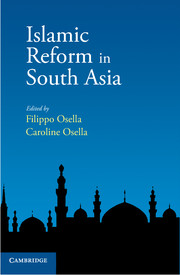Book contents
- Frontmatter
- Contents
- List of Contributors
- Introduction
- Part I Reformist Journeys
- Part II Debating Reform
- 5 The Enemy Within: Madrasa and Muslim Identity in North India
- 6 Islamism and Social Reform in Kerala, South India
- 7 Piety as Politics Amongst Muslim Women in Contemporary Sri Lanka
- 8 The Changing Perspectives of Three Muslim Men on the Question of Saint Worship over a 10-Year Period in Gujarat, Western India
- 9 Women, Politics and Islamism in Northern Pakistan
- 10 Violence, Reconstruction and Islamic Reform: Stories from the Muslim ‘Ghetto’
- Part III Everyday Politics of Reform
- Part IV Reform, State and Market
- Index
7 - Piety as Politics Amongst Muslim Women in Contemporary Sri Lanka
from Part II - Debating Reform
Published online by Cambridge University Press: 05 January 2014
- Frontmatter
- Contents
- List of Contributors
- Introduction
- Part I Reformist Journeys
- Part II Debating Reform
- 5 The Enemy Within: Madrasa and Muslim Identity in North India
- 6 Islamism and Social Reform in Kerala, South India
- 7 Piety as Politics Amongst Muslim Women in Contemporary Sri Lanka
- 8 The Changing Perspectives of Three Muslim Men on the Question of Saint Worship over a 10-Year Period in Gujarat, Western India
- 9 Women, Politics and Islamism in Northern Pakistan
- 10 Violence, Reconstruction and Islamic Reform: Stories from the Muslim ‘Ghetto’
- Part III Everyday Politics of Reform
- Part IV Reform, State and Market
- Index
Summary
Introduction
Muslims are 8.9 per cent of Sri Lanka's population and they live scattered throughout the country in small communities. The only two significant population concentrations are to be found in the Eastern and Western provinces. Although the Sri Lankan conflict is generally described as one between Sinhala and Tamil ethnic groups, Muslims—especially those of the conflict-affected areas of the Northern and Eastern provinces—have been affected by the violence and militarization. They struggle today to have their experiences acknowledged. The Islamic piety movement has become visible in Sri Lanka, with Muslims all over the country adopting the uniforms of piety—hijab and abhaya for women, beard and Tablighi Jama'at's large tunic and pants for men. The movement itself takes many forms. In this essay I argue that the manner in which piety is perceived and propagated among Muslims in Sri Lanka must be understood as located within the context of ethnic conflict and the polarization between ethnic groups that occurred in its wake. I will explore the work of one Muslim women's da'wa (preaching) group—Al Muslimaat—that pioneered the process of making piety popular among lower-middle- and middle-income Muslim women in a semi-urban Colombo neighbourhood. Looking at the group's activities and specifically through analyses of the bayan or lay sermons delivered by their most charismatic member, I will look at the nature of the pious practice that is preached.
- Type
- Chapter
- Information
- Islamic Reform in South Asia , pp. 171 - 201Publisher: Cambridge University PressPrint publication year: 2013



